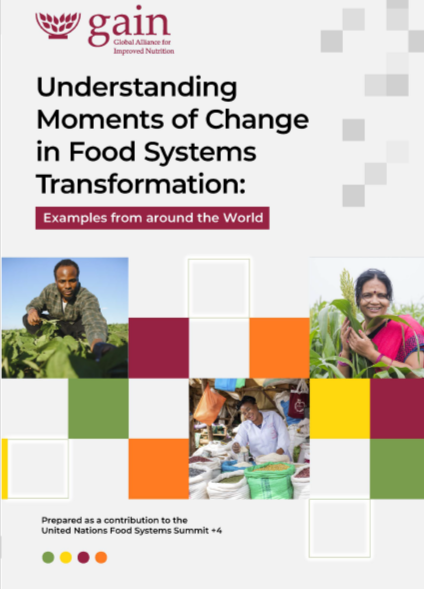This report from the Global Alliance for Improved Nutrition (GAIN) was prepared as a contribution to the United Nations Food Systems Summit + 4.
Contributors to the report: ACF (The Alliance of Champions for Food Systems Transformation); BMZ/GIZ (Deutsche Gesellschaft für Internationale Zusammenarbeit (GIZ) GmbH); FAO (The Food and Agriculture Organization); FOLU (The Food and Land Use Coalition); GAFSP (The Global Agriculture and Food Security Program); GAIN (The Global Alliance for Improved Nutrition); SUN (Scaling Up Nutrition); WFP (The World Food Programme); WRI (The World Resource Institute).
The Report’s Executive Summary
Four years on from the UN Food Systems Summit, how well are we progressing in
transforming food systems so that they reduce hunger, increase access to healthy
diets, reduce climate emissions, improve climate resilience, create good jobs, and
nurture the environment? The numbers tell a mixed story. According to the Food
Systems Countdown Initiative, itself a creation of the UNFSS, only 20 of 42 global food
system indicators are trending positively (1), with none fast enough to meet 2030 SDG
goals. These numbers are important but inevitably reliant on data that are 2–3 years
out of date.
As a complement, this report brings us many new qualitative examples of food system
transformation. They are a partial antidote to the rather gloomy numbers. The
examples are distilled from the experiences of a group of organisations working at the
country level, often together, in close partnership with governments and local
organisations and therefore they represent only parts of the picture. But the snapshots
are highly revealing. They uncover “moments of change”. Sometimes the moments are
obvious: a policy change, a resource reallocation, a shift in strategy. But often they are
hidden in plain sight: the new committee that can make better decisions, the new data
available to assess trade-offs between ministries, the coming together of private and
public sectors in new ways.
These moments are provided from the perspective of the partner organisations who
contributed to them and as such they serve as a supplement to the formal UNFSS+4
report from the UN DSG’s office which summarises food system transformation
perspectives from member states. These collaborators work hand in hand, on a day-to
day basis with government officials, partnering with them to convert policy priorities
into impactful and investible actions, mobilise finance, co-create implementation
capacity, and track progress. Food system transformation is hard, but the rewards are
great if it can be attained. These organisations know the difference between grand
words and the hard graft of implementation, when policy is disconnected from reality,
and how easily progress can be disrupted by external events.
We organise the moments of change around the six calls to action from UNFSS+2:
integration, inclusive governance, investing in data and science, participatory design
and implementation, engagement with businesses, and accessing new finance
sources. And there are many moments of change to celebrate. The success factors
behind these moments of change are clear. Data are needed to get from opinions to
evidence based decisions. Decision-making processes that are inclusive, yet decisive.
Policies that are aligned with policy objectives, not arrayed against them. Budgets that
support objectives rather than undermine them. The creativity to find new ways of
funding food system change. The imagination to align and overlap business and food
system goals. But perhaps the most important factor is trust. The trust to share, to be
humble, to be open and to collaborate.
We are going to need to summon all these factors in greater quantities as we move
towards UNFSS+6 because, as the African Union Special Envoy on Food Systems, Dr.
Mayaki, stated so memorably in Kampala in January 2025 at the CAADP meetings,
“acceleration is now the name of the game”. The organisations behind this report could
not agree more, and we commit to redoubling our efforts as partners with the
governments who are striving to achieve this great transformation of food systems to
accelerate us towards the SDGs.

